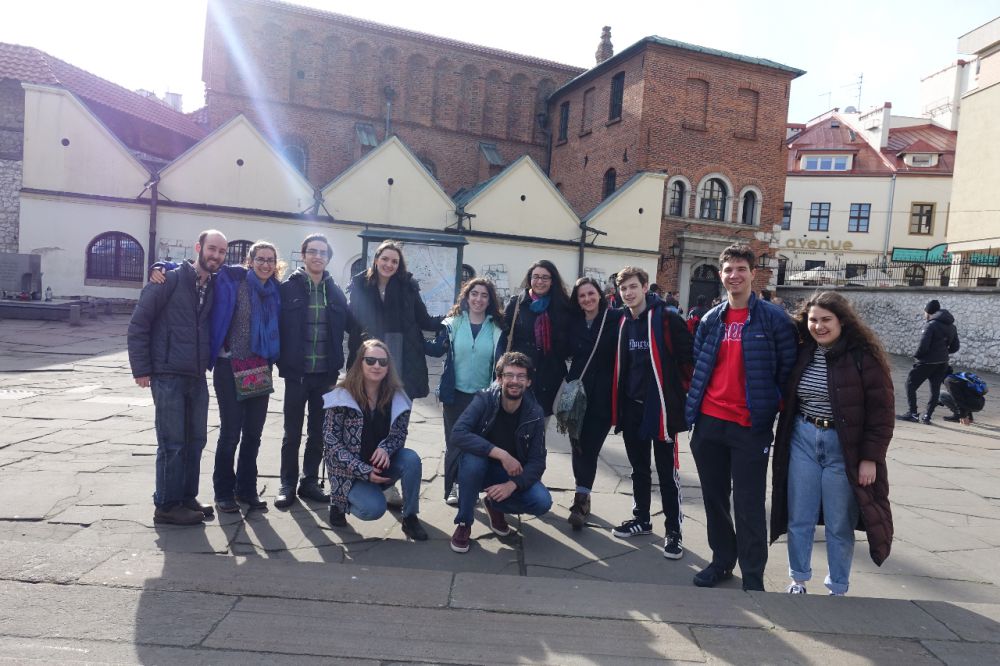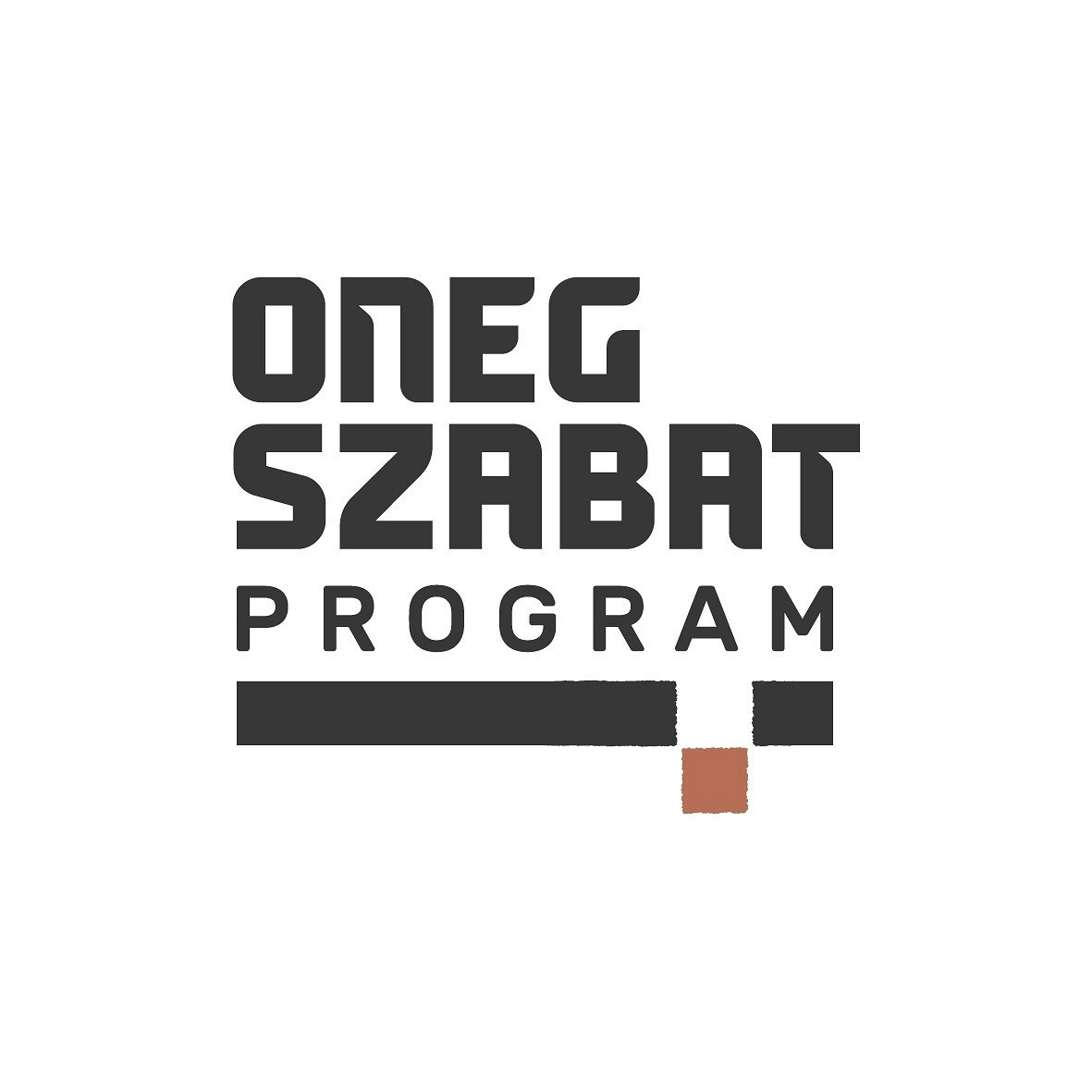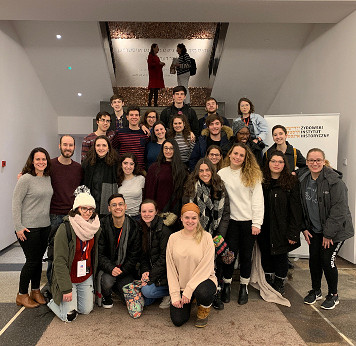- News
- Events
- Oneg Shabbat
- Collections
- Research
- Exhibitions
- Education
- Publishing Department
- Genealogy
- About the Institute
- Bookstore



Elana, Michelle, Elyakim, Elijah, Rachel, Sonia, Isabella, Rachel and Gregory are studying at the University of Pennsylvania in Philadelphia. They came to Poland together with Ira Blum, assistant director at Penn Hillel. Their week-long visit in Poland was organized by the Education Department of the Jewish Historical Institute as a part of the Oneg Szabat Program.
In the program, we emphasise the element of education, especially addressed at young people. Our task, as direct successors and protectors of the Ringelblum Archive, is not only to pass knowledge about the Oneg Shabbat group and their heritage, but also finding ambassadors of this mission among young people, members of the young generations. These people, along with us, will spread knowledge about the Underground Archive of the Warsaw Ghetto.
The contents of the program were provided by the JHI Education Department: Agnieszka Kajczyk, Olga Szymańska, dr Bartek Borys. During workshops, educational walks, they passed the most important information about the reality of life in the Warsaw Ghetto during the occupation – the conditions in which the Oneg Shabbat group worked and lived, the history of creating, hiding and discovering the Archive, as well as its conservation and preservation after the war. Our educators have also accompanied our Ambassadors during their meetings with the Jewish communities in Warsaw and Krakow. Our guests were very interested.
The most important element of the Ambassadors’ stay in Poland was their encounter with the Ringelblum Archive, stored at 3/5 Tłomackie street, in the former Main Judaistic Library – today, the home of the JHI. They visited the permanent exhibition, „What we’ve been unable to shout out to the world”, together with its co-curator Anna Duńczyk-Szulc. Jowita Budnik, who played Rachela Auerbach in Roberta Grossman’s „Who will write our history”, told the story of her character and shared her personal account of what the Ringelblum Archive means to her.
The Ambassadors visited the archive of the Institute and the Conservation Studio, where they have learned about methods of document preservation, saw selected documents from the Archive, such as Gela Seksztajn’s drawings, and one of the containers in which they were hidden. On 7 March, on the anniversary of uncovering the „Krysia” bunker, where Ringelblum, his family and other people were hiding, they participated in the commemorative event dedicated to the founder of the Underground Archive of the Warsaw Ghetto.
They have also visited POLIN – Museum of the History of the Polish Jews, the Nożyk Synagogue, where they met with Anna Chipczyńska, Vice-President of the Jewish Community in Warsaw, JCC Warsaw and JCC Krakow.
They have spent the last three days in Souther Poland, where they visited the Auschwitz-Birkenau Museum, the Jewish Center in Oświęcim, Oskar Schindler’s Emalia factory and Galicia Jewish Museum. Another important part of their stay in Krakow were guided tours of Kazimierz, former Jewish district.
We would like our students, as Ambassadors of the Program, to tell – when they return home – the story of Emanuel Ringelblum, his mission he took on, to which he convinced others and to which he sacrificed his own life and the life of his family.
Soon, an exhibition summarizing the Ambassadors’ stay in Poland will be presented at the Penn Hillel main hall. It will include basic facts about the Underground Archive of the Warsaw Ghetto and Oneg Shabbat, along with reflections on the stay at the JHI and the memory sites. A similar exhibition prepared last year was welcomed with great interests from students.
Both editions of the Program have proven its importance. Its success is owed not only not only to the JHI and Penn Hillel staff, but also donators and friends of the Oneg Szabat Program, who have been supporting our activities.
We would like anyone, who will learn about the history of the Ghetto Archive and who would like to share it, to become an Oneg Szabat Ambassador, regardless of their age or location.
Penn Hillel students, our new Ambassadors, have left a few kind words – a very important message for us:
So amazing to read actual words from the archives. Very impactful. We’ve heard a lot from various people but this was a chance to hear from the writers themselves.
It was so special to hear about the courage of Ringelblum and others in preserving our history, to see how you all continue to dedicate yourselves to this same history, and to experience Jewish life today. The combo of history, preservation, and present was beautiful and so meaningful.
Thank you!

Applications to the Oneg Szabat Ambassadors program can be sent to: ambassadors@jhi.pl.
More information about the Oneg Szabat Ambassadors Program
-------------------------------
The Oneg Szabat Ambassadors Program is an element of the Oneg Szabat Program implemented by the Jewish Historical Institute and the Association of the Jewish Historical Institute of Poland, within a public-private partnership.
